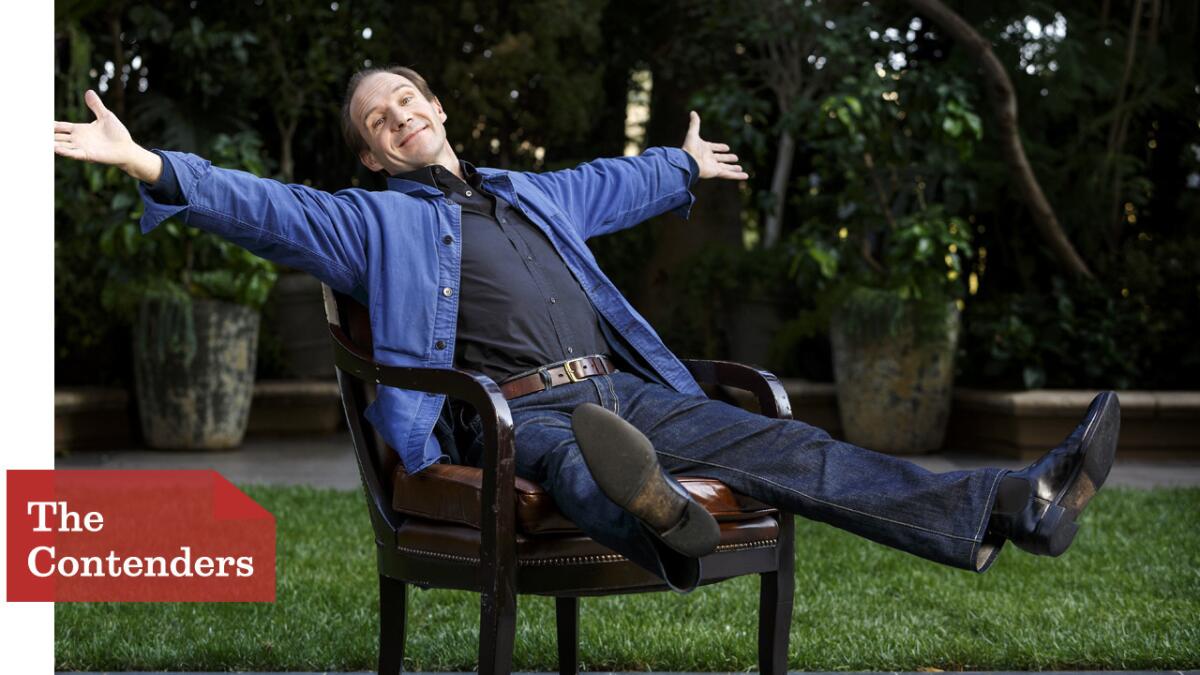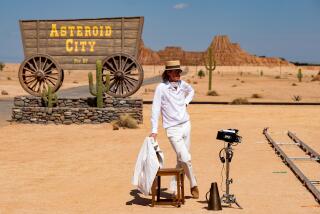The Envelope: Ralph Fiennes on nostalgia, heart in Wes Anderson’s ‘Grand Budapest Hotel’

- Share via
Will it surprise anyone to learn that British actor Ralph Fiennes, who so delightfully brought to life eccentric concierge M. Gustave in “The Grand Budapest Hotel” this past spring, was once a real-life apprentice in the high-class hospitality trade? “I was the lowest of the low,” he recalls ruefully of his time as a young house porter at Brown’s Hotel, a five-star establishment in London’s Mayfair district. “I was basically a dogsbody for the housekeeping department — my job was to Hoover the corridors, clean the brass, change the shower curtains.”
While briefly promoted to hall porter, he got to wear the hotel uniform — brown with snappy gold braid — and interact with guests, which led to a brush with movie stardom: “I carried Jack Palance’s cases to his car.” A short time later, he quit to attend drama school and, after performing Shakespeare on the London stage, became a screen star himself, in such movies as “Schindler’s List,” “Quiz Show,” “The English Patient” and the “Harry Potter” franchise.
In preparing to play Gustave, he says he harked back to that experience at Brown’s. “As stylized as it was, I needed to know that there was a real life behind this character. So I decided he had also been a porter, that his father had been an impoverished shoemaker and [Gustave] had caught his first glimpse of this other world when he was sent around to deliver a pair of shoes for a wealthy client.”
Fiennes had another experience to draw on for the story, set in a fictional European spa town in the 1930s: He had played the lead in István Szabó’s film “Sunshine,” about a Hungarian Jewish family in Budapest and Vienna in the golden era before fascism descended. And he also read Viennese writer Stefan Zweig’s “The World of Yesterday,” which provided much of the inspiration for writer-director Wes Anderson. “For me,” says Fiennes, “Gustave is representing that bygone world, where things like a table beautifully laid with precision and order mattered, because they’re about a civilization and the best of human aspiration.”
Much of the fun and lunacy in Anderson’s movie occurs when refinement and coarseness collide: The well-spoken Gustave bursts into profanity or, alternately, greets the hulking soldiers of a Nazi death squad with beautiful manners and good cheer. “It isn’t just material things that Gustave places great value on, but the courtesy of how you greet someone, how you help someone,” notes Fiennes. “And what’s attractive about him is that when the chips are down and he’s faced with a real moral choice, he’s completely, effortlessly brave, as a point of principle, in protecting young Zero,” his lobby boy apprentice, played by Tony Revolori.
To capture the tone that would propel the movie — a caper comedy with farcical elements that nonetheless sticks a poignant landing — Anderson directed his cast to watch the urbane comedies of filmmakers Ernst Lubitsch and Billy Wilder from the 1930s and ‘40s. In particular, the performance by Jack Benny in Lubitsch’s “To Be or Not to Be,” in which a troupe of actors dares to slyly ridicule the Nazis, impressed Fiennes. “The dialogue is rapid-fire, with a particular rhythm — not exactly natural, but it seems natural in the hands of great actors,” he says.
Also essential to the comic tone of Anderson’s movie are the physical movements performed (sometimes in tandem) by Gustave and Zero. “You’re very aware that your physical alignment is part of a picture he’s making,” says Fiennes. “He has a good eye for what physical shapes and gestures are funny, and he can demonstrate. Other times, I would just feel what was needed and do it,” such as when police come to arrest Gustave [mistakenly] for murder, and Fiennes pivots and scrams, arms and legs pumping high, leading the cops in a madcap chase up the hotel’s grand staircase.
Fiennes, in L.A. recently to appear at a four-film tribute given him by the American Cinemateque at the Aero Theater in Santa Monica, lives mostly in London, where he’ll next appear at the National Theatre in George Bernard Shaw’s “Man and Superman.” But he keeps an apartment in New York, a city he enjoys for the vibrancy of its theater and street life, and its proximity to pals like Liam Neeson.
The rumor that these two thinking woman’s heartthrobs do yoga together, though, is merely an example of Neeson’s sense of humor. “I showed him some basic yoga positions, years ago, and he indulged me. And then he threw that out in an interview and started that story,” Fiennes says. “What I actually love to do with Liam is go walking in the country, where he has a place in upstate New York. We’ve had some great walks.”
In wrapping up, he mentions a scene in “Grand Budapest” that meant the most to him: It’s when Gustave rendezvous with Zero after escaping from prison only to find that Zero has forgotten to bring any number of important things.
“He’s petulant and irritated because Zero hasn’t been as efficient as he would expect, so he rails at him,” says Fiennes. Then Zero reveals a great tragedy in his past, and Gustave does an about-face. “He has the wonderful grace and humility to say, ‘I am so sorry. I didn’t know,’ and that has always moved me. You don’t see that very often in films, people saying I’m really sorry, forgive me. I love the way Wes has written the arc of that. It’s the scene where you see Gustave’s humanity most clearly.”
More to Read
From the Oscars to the Emmys.
Get the Envelope newsletter for exclusive awards season coverage, behind-the-scenes stories from the Envelope podcast and columnist Glenn Whipp’s must-read analysis.
You may occasionally receive promotional content from the Los Angeles Times.










